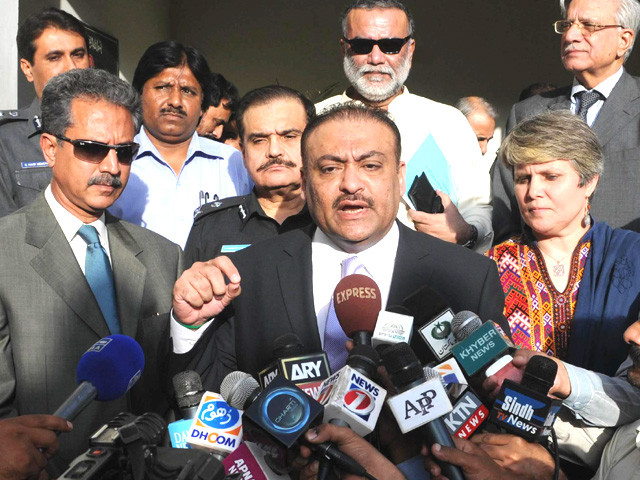Islamabad officials assure Karachi its police are free
National Assembly Standing Committee says Karachi police fully prepared to rein in the menace of target killings.

The five-member committee including Patel, Roshan Junejo of the Pakistan Peoples Party (PPP), Waseem Akhtar of the Muttahida Qaumi Movement (MQM), Awami National Party’s (ANP) Bushra Rehman and Mehmood Wardag of the Pakistan Muslim League-Nawaz (PML-N) gave a five-minute press briefing at the central police office on Wednesday.
“Today we visited the Rangers Headquarters and the central police office and we were briefed about the recent incidents of violence in the city,” Patel said, adding, “We are satisfied with the preparations and actions taken by the police.”
He parried questions about when the police or Rangers would start an operation against the target killers. “They will take action wherever they think it is necessary,” he said.
Patel assured that there would be no political interference in the police’s action against criminals. “We have assured the police high-ups of no political interference.”
But the police have a different story to tell.
Officials say they are frustrated as they know 90 per cent of the criminals involved in target killings but cannot do much because of “political influence”. “Everyone blames us for the ongoing violence in the city but the reality is that we are helpless ourselves,” a senior police official told The Express Tribune, requesting anonymity.
The police said that members of the three coalition parties in the federal government are involved in these killings and that is the reason why their hands were tied. “We never received instructions from the government to take stern action against these elements. We are just watching everything happen like common people,” he went on to say, adding, “Everything is decided in Governor and Chief Minister House.”
The official claimed that if the police and law-enforcement agencies were allowed to work freely, they could curb target killings within two days. “I am more than hundred per cent sure we can crush the criminals.”
The Sindh police works under the supervision of the provincial home department and that is where they get their instructions from. “Whenever a government is sincere about taking any action, they ask the police to do something. However, I have not seen any such thing during the last one year here,” said the official.
Policemen are killed either during investigations of these target killing cases or just because they are affiliated with the [investigation] department, he said. Around 50 policemen have lost their lives so far.
He said all the three major political parties are fighting for control of the resources of Karachi and that is inflaming the violence.
Another problem is a lack of witnesses to take on the criminals. According to a district and sessions judge, the matter is really sensitive. “Yes, it is true that judges are also threatened ... But at large, no one comes forward as a witness and the judge has no other option but to release the criminals,” he explained.
Bad public image
Apart from dealing with reticent politicians, the police and intelligence agencies also have to deal with a severe trust deficit - a byproduct or backlash from their own performance. “People are not ready to cooperate with us,” a Crime Investigation Department (CID) senior officer said. “You arrest them and investigate the case and produce them in the courts. No one comes forward to give evidence against them and then the judiciary releases them,” he said, adding, “When the criminals are released, they first kill the police officials who are involved in the investigations.”
Trouble in Lyari
Intelligence and police officials believe that the turf war in Lyari has a political face - two major coalition partners in the Sindh government are involved in indirect fighting there. Lyari is a stronghold of the Pakistan Peoples Party and before the 2008 general elections, the officials believe another major political party had rooted itself in the drug-addled neighbourhood.
When the present government set-up was organised, one political party started kicking the other out of the area and undoing its efforts. That has led to the clashes. “Lyari gangsters are not a big threat. The number of criminals is very small and we can easily take them down. But, again, the problem is political,” the police official claimed.
Published in The Express Tribune, October 28th, 2010.


















COMMENTS
Comments are moderated and generally will be posted if they are on-topic and not abusive.
For more information, please see our Comments FAQ